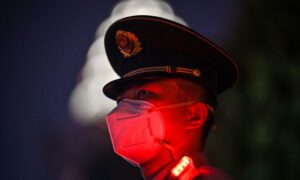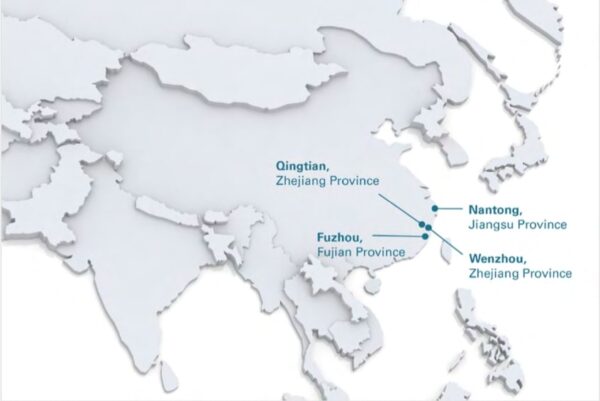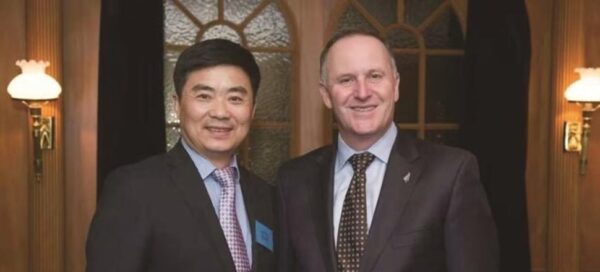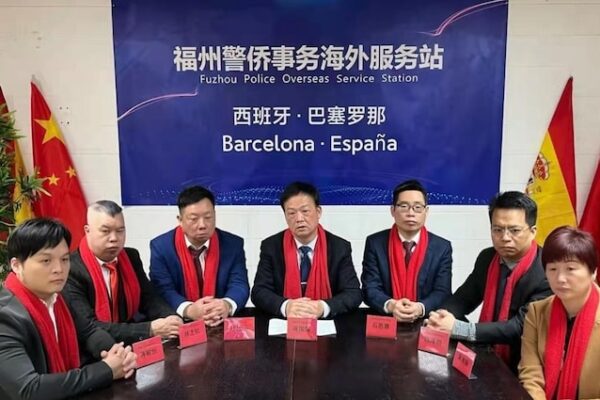Beijing ‘Police Station’ in New Zealand Linked to Prominent Businessman and United Front
Beijing’s overseas police station in New Zealand has been revealed and linked to a Chinese businessman who has close relations with the nation’s politicians.The “overseas police service station” is located at 115 Great South Road, Epsom, Auckland, which is close to the Chinese consulate in the city and the University of Auckland, according to a contact list of Nantong police’s overseas service stations posted on QQ, a social media platform owned by China’s state-owned tech giant Tencent, in 2020. The station is among 102 Chinese Communist Party (CCP)-operated illegal police outputs in 53 countries that have been recently publicised by Spain-based human rights NGO Safeguard Defenders in its report, “Patrol and Persuade.” These outputs, in different names (such as “contact points”) and under the surface of serving overseas Chinese, can be used by the communist regime to monitor overseas Chinese community, as well as “harass, threaten, intimidate, and force targets to return to China for persecution.” Chinese police jurisdictions. (Safeguard Defenders) The Man Behind the Scene The site in Auckland is linked to Zhou Jiexiang, active in the country’s political circles, and connected to the CCP’s United Front department. Zhou is the owner of a business located at the address in 2017, according to New Zealand’s Companies Register records. The place remains the registered address of Golden Key Development (NZ) Limited, a company co-shared by Zhou and Nantong Jinshi, a Chinese business. In a 2017 article by Jiangsu TV station announcing the establishment of Nantong police’s overseas service centres in seven countries, including New Zealand, a man resembling Zhou was pictured holding a “coordinator certificate” in a group photo. An article about Zhou published in 2020 on ausnz.net, a website in Chinese listed his senior positions in a series of United Front organisations, including a member of the Nantong and Hai’an committee of the Chinese People’s Political Consultative Conference, which was described as “the most important United Front forum,” in a report by the Australian Strategic Policy Institute in 2020. In October, Zhou wrote an article celebrating the CCP’s 20th Congress. “We overseas compatriots will continue to closely unite around the Party Central Committee with Comrade Xi Jinping as the core,” he wrote. The first president of the New Zealand Nantong Hometown Association also appears to have close relations with some Kiwi politicians. Chinese businessman Zhou Jiexiang was pictured with former New Zealand Prime Minister John Key. (Wenhua Weekly) Zhou was pictured with Auckland Mayor Phil Goff at a 2016 celebration ceremony for the launch of the Association, while in a story published in May, he was pictured rubbing shoulders with former prime minister Sir John Key, who is known for a pro-Beijing stance. New Zealand Government’s Response The New Zealand government has launched an investigation into the presence of Chinese police in the country. Prime Minister Jacinda Ardern said she had received no indications about the issue before but had now ordered a briefing. New Zealand police, the Department of Prime Minister and Cabinet (DPMC), and the Ministry of Foreign Affairs are looking into the allegation, NZ Herald reported. National foreign affairs spokesman Gerry Brownlee said this was a “serious allegation” and New Zealand’s police authorities need to be looking into the issue. Tony Lynch, the deputy chief executive of DPMC, said officials were reviewing the report although the agency had no evidence that a Chinese police station was operating in New Zealand. “Foreign interference can harm New Zealand’s sovereignty, democracy, economy, national interests, reputation, and social cohesion. We continue to stay alert to any type of foreign interference in New Zealand,” he told Stuff. The CCP has rejected the allegations of running overseas police stations, saying that the “service centres” are to assist overseas Chinese with administrative tasks, such as driving license renewals, and no Chinese government agency, including local authorities and public security organs, has any relationship with them. “We hope that relevant parties stop hyping it up to create tensions. Using this as a pretext to smear China is unacceptable,” China’s Ministry of Foreign Affairs told CNN in November. The Wenzhou police in China said that the contact point should still be operating. (WeChat: Fuzhou Police) China Experts Calling for International Action The overseas presence of CCP police isn’t a surprise to some China experts. “It is not really ‘news’ that the Chinese authorities operate an overseas police presence around the world,” Dr. Lin Bin, a Sydney-based political scientist, previously told The Epoch Times. “In every Chinese embassy or consulate, military attaches are part of its staff. Ostensibly, the military attaches work as security guards to keep an eye on the security of the embassy or c

Beijing’s overseas police station in New Zealand has been revealed and linked to a Chinese businessman who has close relations with the nation’s politicians.
The “overseas police service station” is located at 115 Great South Road, Epsom, Auckland, which is close to the Chinese consulate in the city and the University of Auckland, according to a contact list of Nantong police’s overseas service stations posted on QQ, a social media platform owned by China’s state-owned tech giant Tencent, in 2020.
The station is among 102 Chinese Communist Party (CCP)-operated illegal police outputs in 53 countries that have been recently publicised by Spain-based human rights NGO Safeguard Defenders in its report, “Patrol and Persuade.”
These outputs, in different names (such as “contact points”) and under the surface of serving overseas Chinese, can be used by the communist regime to monitor overseas Chinese community, as well as “harass, threaten, intimidate, and force targets to return to China for persecution.”

The Man Behind the Scene
The site in Auckland is linked to Zhou Jiexiang, active in the country’s political circles, and connected to the CCP’s United Front department.
Zhou is the owner of a business located at the address in 2017, according to New Zealand’s Companies Register records. The place remains the registered address of Golden Key Development (NZ) Limited, a company co-shared by Zhou and Nantong Jinshi, a Chinese business.
In a 2017 article by Jiangsu TV station announcing the establishment of Nantong police’s overseas service centres in seven countries, including New Zealand, a man resembling Zhou was pictured holding a “coordinator certificate” in a group photo.
An article about Zhou published in 2020 on ausnz.net, a website in Chinese listed his senior positions in a series of United Front organisations, including a member of the Nantong and Hai’an committee of the Chinese People’s Political Consultative Conference, which was described as “the most important United Front forum,” in a report by the Australian Strategic Policy Institute in 2020.
In October, Zhou wrote an article celebrating the CCP’s 20th Congress.
“We overseas compatriots will continue to closely unite around the Party Central Committee with Comrade Xi Jinping as the core,” he wrote.
The first president of the New Zealand Nantong Hometown Association also appears to have close relations with some Kiwi politicians.

Zhou was pictured with Auckland Mayor Phil Goff at a 2016 celebration ceremony for the launch of the Association, while in a story published in May, he was pictured rubbing shoulders with former prime minister Sir John Key, who is known for a pro-Beijing stance.
New Zealand Government’s Response
The New Zealand government has launched an investigation into the presence of Chinese police in the country.
Prime Minister Jacinda Ardern said she had received no indications about the issue before but had now ordered a briefing.
New Zealand police, the Department of Prime Minister and Cabinet (DPMC), and the Ministry of Foreign Affairs are looking into the allegation, NZ Herald reported.
National foreign affairs spokesman Gerry Brownlee said this was a “serious allegation” and New Zealand’s police authorities need to be looking into the issue.
Tony Lynch, the deputy chief executive of DPMC, said officials were reviewing the report although the agency had no evidence that a Chinese police station was operating in New Zealand.
“Foreign interference can harm New Zealand’s sovereignty, democracy, economy, national interests, reputation, and social cohesion. We continue to stay alert to any type of foreign interference in New Zealand,” he told Stuff.
The CCP has rejected the allegations of running overseas police stations, saying that the “service centres” are to assist overseas Chinese with administrative tasks, such as driving license renewals, and no Chinese government agency, including local authorities and public security organs, has any relationship with them.
“We hope that relevant parties stop hyping it up to create tensions. Using this as a pretext to smear China is unacceptable,” China’s Ministry of Foreign Affairs told CNN in November.

China Experts Calling for International Action
The overseas presence of CCP police isn’t a surprise to some China experts.
“It is not really ‘news’ that the Chinese authorities operate an overseas police presence around the world,” Dr. Lin Bin, a Sydney-based political scientist, previously told The Epoch Times.
“In every Chinese embassy or consulate, military attaches are part of its staff. Ostensibly, the military attaches work as security guards to keep an eye on the security of the embassy or consulate.
“However, they may not tell you that they have some other duties. They may try to collect information about the military of other countries.”
Chin Jin, the chair of the Federation For A Democratic China, refutes the CCP’s justification of its overseas police presence.
“Beijing says that the extra police presence is to help overseas citizens and fight crime. This is poor logic and saying white is black,” he said. “Beijing is the biggest criminal group and organization in the world, but most Western countries are not aware of it.”
Chin, who holds a PhD of Social Sciences from the University of Sydney, calls for Western countries to take action against the communist regime.
“As long as the West is awake, Beijing’s extra police presence will immediately be like a demon disappearing without a trace in broad daylight.”













